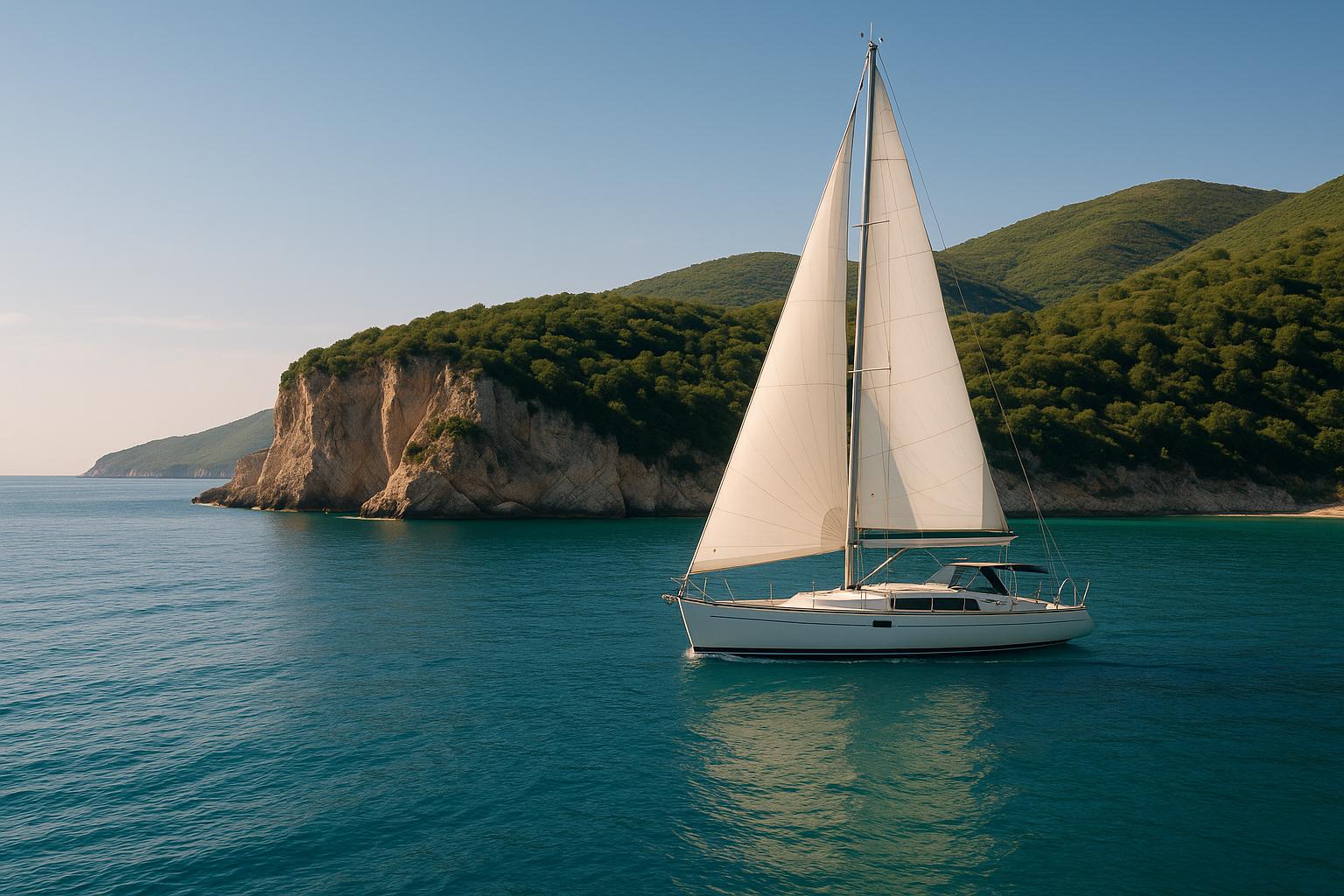Albania is blending its rich culinary roots with modern practices to promote responsible food tourism. The country’s cuisine, shaped by Mediterranean and regional influences, is attracting visitors seeking genuine experiences. Efforts like farm-to-table dining, preserving recipes passed down for generations, and supporting local farmers are creating economic opportunities while respecting nature. Challenges remain, such as improving infrastructure and managing growing tourist numbers, but Albania’s approach shows how food tourism can boost local economies and protect heritage.
Key points:
- Albania welcomed 10 million tourists in 2023, a sharp rise from 4 million in 2016.
- Small family farms (average size 1.4 hectares) play a central role in food tourism.
- Initiatives like RRNO and agritourism projects are preserving recipes and farming methods.
- The government prioritizes nature conservation over unchecked tourism growth.
Albania’s food tourism is a model for balancing heritage and responsible practices, offering visitors a rich and immersive journey.
Sowing the future: Agritourism and sustainable food systems in Albania
1. Albanian Culinary Heritage Practices
Albania has embarked on a journey to reclaim and celebrate its culinary heritage, using food tourism as a bridge to its rich past. After decades of restrictions and the wave of emigration post-1991, the country is now rediscovering its gastronomic identity, marking an exciting revival of traditions.
Preservation of Culinary Heritage
In 2018, brothers Bledar and Nikolin Kola founded RRNO, a nonprofit organization with a mission to safeguard Albania's culinary traditions. Their efforts brought together 12 gjyshet (grandmothers) and 12 chefs at Tirana's pazari, creating a space where traditional knowledge could be exchanged and celebrated.
"How can our food survive if nobody knows how to actually make it?" – Nikolin Kola
This initiative sparked further efforts, including televised projects aimed at documenting fading culinary practices. Beyond recipes, chefs across Albania have been working to preserve traditional methods tied to dairy, meat, and fat preparation - techniques that faced significant challenges during times of scarcity. These efforts are ensuring that Albania's culinary roots are not only remembered but also woven into sustainable tourism practices.
Economic Benefits to Local Communities
The push to preserve traditional cuisine has also brought economic opportunities. A growing interest in native ingredients and farming methods has opened up new revenue streams for agriculture. Traditional restaurants are flourishing as chefs return home to reinterpret classic dishes, creating jobs and passing down culinary skills to the next generation.
Integration of Tourism and Agriculture
A farm-to-table approach is now thriving in Albania, with chefs sourcing ingredients directly from local farmers. This collaboration strengthens both agriculture and tourism, while showcasing the diversity of Albania's culinary landscape, shaped by historical influences and regional specialties.
"It's important to understand that for Albanians, these traditions have been carried on by word-of-mouth for so many years. The amount of care which goes into this food can only equate to the love a grandmother offers." – Fejsal Demiraj, S.A.L.T Kitchen
Organizations like RRNO are playing a key role in documenting and preserving these traditions, making them accessible to locals and visitors alike. This careful blend of heritage and sustainability highlights Albania's dedication to keeping its culinary story alive while embracing modern tourism initiatives.
2. Responsible Tourism Methods in Albania
In Albania, responsible food tourism does more than just attract visitors - it uplifts communities, safeguards nature, and supports local economies. The country has embraced methods that show how tourism can positively impact both people and the environment.
Environmental Impact
Albania has made environmental protection a cornerstone of its food tourism strategy. Mirela Kumbaro Furxhi, Minister of Tourism and Environment of Albania, highlighted this commitment by stating:
"The interests of nature conservation, biodiversity protection and sustainable development will always prevail over tourism investments"
This policy ensures that tourism development respects Albania's natural beauty and heritage. For instance, agritourism initiatives promote sustainable farming while protecting native plants and biodiversity. Activities like rafting and fishing are carefully managed to align with conservation goals, preserving both the environment and cultural traditions.
The "farm-to-fork" approach is another key element. By reducing transport distances, it not only supports local ecosystems but also ensures that tourism growth remains balanced with environmental preservation. These efforts don’t just protect nature - they also create economic opportunities for rural communities.
Economic Benefits to Local Communities
Responsible food tourism has become a game-changer for Albania's economy. In 2020, tourism contributed around 17% of the country's GDP, with directly related industries accounting for 3.1%. Tourist numbers have skyrocketed - from 4 million visitors in 2016 to 8.4 million between January and October 2023, with over 10 million foreign visitors recorded by the end of the year.
For rural areas, this influx translates into direct benefits. Agriculture, which makes up 19.3% of GDP and employs 33.8% of the workforce, has found new opportunities through sustainable food tourism. Even with small average farm sizes of just 1.4 hectares, tourism is helping farmers boost their incomes and improve their livelihoods. It also provides jobs for marginalized groups and women, helping to reduce urban migration and encouraging children to stay in school. Beyond economic gains, tourism plays a role in preserving Albania's culinary traditions.
Mark Huggins from Undiscovered Destinations shared his optimism about the region’s potential:
"I strongly believe that this area of the Balkans will see strong growth in tourism in the coming years and with good reason as it has so much to offer. As such there will be challenges but I believe that visits from small groups with a high regard for responsible tourism will help to envelop a more protectionist attitude to the natural environment in the region amongst local people, as they start to see the economic benefits that tourism will bring."
Integration of Tourism and Agriculture
Albania is also blending tourism and agriculture to strengthen local markets. This approach bridges the rural-urban divide, creating sustainable food systems that benefit both farmers and tourists. Visitors increasingly seek high-quality local food, and this demand opens up new opportunities for local farmers while reinforcing traditional practices.
One standout example is the Lile family farm and restaurant, located near the Vjosa Wild River National Park. The Liles grow their own produce and serve traditional dishes inspired by both Albanian and Greek cuisine. They also produce wine, gliko, and raki, while sourcing items like milk, cheese, and eggs from neighboring farmers. This creates a supportive network within the community. The farm has benefited from the Rural Association Support Programme (RASP), which provided training on irrigation, composting, and reducing pesticide use.
Irfan Tarelli, General Director at the Ministry of Agriculture and Rural Development, emphasized the importance of agritourism:
"The interventions we heard today confirmed that it is a priority to consider agritourism as a vehicle for food systems transformation, given the importance of both tourism and agriculture for our economy. Albania's food system can be transformed if we are able to innovate, for example through new partnerships, upgraded technologies, and creative educational models"
Agritourism entrepreneurs also play a mentoring role, guiding farmers on production methods and market needs. Eldi Ceco from ABA Centre explained:
"I learned that agritourism entrepreneurs need to act as guides for farmers in their area: how to produce, what to produce and when it will be needed. So, they should combine their business with the small family businesses around them"
This collaborative model ensures that tourism supports traditional farming rather than replacing it. By doing so, it creates a sustainable framework that benefits entire communities while celebrating Albania's culinary heritage.
sbb-itb-dfcc1b7
Pros and Cons
Balancing heritage preservation with sustainable tourism presents both opportunities and challenges. This balance is key to understanding the benefits and drawbacks of each approach.
| Aspect | Heritage Practices | Responsible Tourism Methods |
|---|---|---|
| Strengths | • Preserves Albanian identity through traditional dishes like byrek and tavë kosi • Attracts tourists looking for genuine cultural experiences • Supports local producers and family-run businesses • Protects generational knowledge and cooking traditions |
• Safeguards Albania's natural landscapes and biodiversity • Reduces environmental impact with farm-to-table practices • Appeals to eco-conscious travellers • Promotes long-term economic stability for communities |
| Weaknesses | • Sometimes resists necessary environmental changes • Traditional methods can demand high resource use • Struggles to scale for growing tourism needs • Risk of over-commercialisation eroding authenticity |
• Requires heavy investment in training and infrastructure • May lead to changes in cherished traditional practices • Risk of superficial "greenwashing" without real community involvement • Potential loss of cultural depth when sustainability overshadows tradition |
| Economic Impact | • Boosts rural incomes through traditional farming • Preserves cultural identity that sets Albania apart • Creates jobs linked to heritage tourism |
• Strengthens local economies by attracting eco-focused travellers • Builds regional resilience for long-term growth |
Navigating Challenges and Opportunities
Traditional methods, while rich in history, sometimes clash with modern sustainability goals. For instance, time-honoured cooking techniques might rely on resource-heavy processes, putting strain on local ecosystems. Additionally, the pressure to deliver "authentic" experiences can hinder innovation, making it harder to adapt to evolving tourist preferences.
On the other hand, responsible tourism methods face hurdles too. Sustainability efforts often require significant investment in infrastructure and training, which can burden small, family-run businesses - the backbone of Albania's food tourism industry. There's also the danger that sustainability becomes a mere marketing tactic rather than a genuine, community-driven effort.
Finding the Balance
The key to success lies in blending tradition with sustainability. Many operators have embraced this by sourcing ingredients locally and seasonally, which minimizes environmental impact while supporting traditional farming. They also create educational experiences that celebrate both Albania's culinary heritage and its commitment to environmental care.
The growing number of visitors underscores the urgency of this balance. In May 2025 alone, Albania welcomed over 1.6 million tourists - a 4.3% increase from the previous year. This surge puts pressure on both cultural traditions and natural resources, making scalable solutions essential to protect what makes Albanian food tourism unique.
Modern travellers increasingly seek both authenticity and eco-consciousness. When local communities lead efforts to preserve traditions while advancing sustainable practices, the outcomes tend to be more genuine and effective. Conversely, externally imposed changes often risk undermining both cultural and environmental goals.
The most forward-thinking Albanian food tourism businesses understand that heritage and sustainability aren't opposing forces. Instead, they complement each other, creating a powerful synergy that respects the past while paving the way for a more sustainable future.
Conclusion
Albania has shown that tradition and sustainability can work hand in hand when it comes to food tourism. By preserving its culinary heritage, the country not only protects its environment but also fuels economic growth. This balance is reflected in the rising number of visitors and the flourishing of local agriculture.
Agriculture plays a significant role in Albania's economy, contributing 19% to the national GDP. Around 85% of the country's cultivated land is managed by small family farms, with an average size of just 1.2 hectares. This setup naturally supports the use of traditional and sustainable farming practices.
A great example of this harmony is the Lile family farm, which combines local sourcing with age-old techniques.
The Albanian government has made its priorities clear. Minister Mirela Kumbaro Furxhi emphasized:
"The interests of nature conservation, biodiversity protection and sustainable development will always prevail over tourism investments."
This commitment has led to tangible results. In 2022, Albania expanded its protected areas to cover 21.4% of its land, and in 2023, it ranked fourth globally for the highest percentage increase in international tourist arrivals. The establishment of the joint Ministry of Tourism and Environment in 2017 further ensures that tourism growth aligns with environmental protection.
Albania's approach offers valuable insights for culinary tourism worldwide. By focusing on community participation, local sourcing, and small-scale operations, the country delivers the kind of authentic experiences that modern travellers crave - 67% of whom now prioritize food experiences when planning their trips.
Through its support for small family farms, dedication to preserving culinary traditions, and commitment to protecting its natural landscapes, Albania has crafted a tourism model that benefits local communities, attracts global visitors, and safeguards its rich culinary heritage for generations to come.
For those looking for an authentic and eco-conscious travel experience, Albania's food tourism sector offers a truly immersive journey.
FAQs
How does Albania preserve its culinary traditions while promoting sustainable food tourism?
Albania takes pride in its rich culinary traditions, rooted in time-honored farming techniques and the use of fresh, locally sourced ingredients like olive oil, native herbs, and seasonal produce. These practices not only celebrate the country's distinct food culture but also provide vital support to small farmers and rural communities.
In step with sustainable tourism, initiatives such as agritourism and food festivals shine a spotlight on eco-conscious practices while showcasing Albania's unique flavors. Additionally, efforts to align food safety standards with EU regulations help protect biodiversity and uphold traditional farming methods, offering visitors a genuine and sustainable food tourism experience.
How does Albania support local farmers and preserve its traditional culinary heritage?
Albania takes pride in supporting its local farmers and celebrating its rich culinary heritage through various initiatives that emphasize sustainability and tradition. Farmers are encouraged to embrace organic and sustainable farming practices, like crop rotation and agroforestry, which help preserve soil quality and promote biodiversity. These efforts often receive backing from both national and international programs focused on enhancing food safety and elevating agricultural standards.
Agritourism has become a vital bridge between farmers and visitors, offering a platform to share traditional Albanian cuisine and time-honored farming methods. This approach not only strengthens rural economies but also safeguards the country’s food traditions. By weaving these initiatives into the fabric of sustainable tourism, Albania ensures its culinary legacy remains vibrant while supporting environmental health and economic growth.
What challenges does Albania face in growing its food tourism industry, and how are they being tackled?
Albania’s food tourism sector has some hurdles to overcome, including improving infrastructure, broadening air travel links, and elevating hospitality service standards. These factors play a big role in shaping both accessibility and the overall experience for visitors.
To tackle these issues, Albania is focusing on upgrading its transport and tourism facilities, encouraging eco-friendly practices, and providing better training for hospitality workers. The country is also working on diversifying its tourism options by blending culinary adventures with its stunning landscapes and rich heritage. This approach aims to create a more dynamic and enjoyable experience for travelers.


